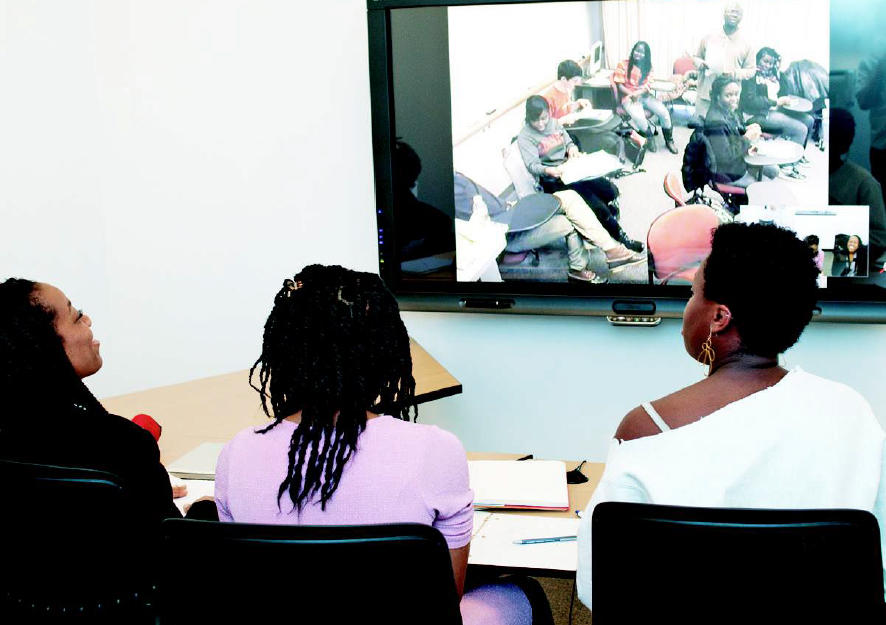It was in some ways a typical beginner’s language class at Columbia: undergraduates spoke haltingly as their instructor gently corrected them. After one student pronounced a phrase particularly well, another asked how to say “show off.” As laughter broke out, the instructor wrote asehan on the whiteboard.
The students were learning a West African language, Yoruba, that had not been offered at Columbia in several years. More unusual was that their instructor was two hundred miles away — at Cornell. There, in a classroom in Ithaca, seven Cornell undergraduates occasionally shifted their gaze away from their professor toward a large monitor and spoke with three other classmates participating via videoconference from Morningside Heights.
This novel arrangement is part of an effort by Columbia, Cornell, and Yale to give one another’s students an opportunity to study languages that might otherwise be unavailable at their own university because of low demand. The program is made possible by a two-year, $1.2 million grant from the Andrew W. Mellon Foundation.
“It’s a way to optimize our resources,” says Stéphane Charitos, director of Columbia’s Language Resource Center. “Each of our institutions has a few faculty who are experts in languages that are not commonly taught. It only makes sense to share our courses so that we can offer all our students access to the broadest range of language and cultures possible.”
The grant from the Mellon Foundation — which could double if the program is successful — comes after years of government cuts in Title VI funding, which supports foreign-language instruction. Universities rely on Title VI funding to subsidize the teaching of languages with low enrollment.
The course-sharing program began last fall with Columbia beaming its entry-level Tamil and Romanian classes to Yale, while students here got to learn Yoruba from Cornell. In future semesters, Columbia may transmit Catalan, Serbian-Croatian-Bosnian, Tibetan, Ukrainian, and Wolof courses, among others, to its Ivy partners, according to Charitos; Columbia students may gain access to IsiZulu, Khmer, and Sinhala classes.
While the shared classes are made possible by digital technology, they are not massive open online courses, or MOOCs, which have gained popularity over the last year. Classes are limited to twelve students. Instructors and students interact in real time through remote-controlled cameras and seventy- inch, interactive whiteboards.
“You have to come to class on a regular schedule,” Charitos says. “This is not ‘I’m sitting in my dorm room in my PJs and doing my French class at four in the morning.’”
Columbia lecturer Mona Momescu, who teaches elementary Romanian, says she tried to build a sense of community between her two Columbia students and their three Yale classmates in a course this past spring by pairing students from different schools on class projects.
“Except for the distance, it’s a regular classroom,” says Samuel Sudanandha, a Columbia lecturer whose Tamil class last fall included a Yale student. “The technology is well advanced, so there are no jarring audio problems, which helps in language teaching, where you need clear sound.”
Omoyeni Clement, a Columbia sophomore, says studying Yoruba has drawn her closer to her Nigerian family. Born in Canada to immigrants who spoke only English at home, she says her first trip to Nigeria as a child “was one of the biggest culture shocks in my life.” Relatives teased her for not understanding her native language.
Many in the program are students from immigrant families who want to forge a stronger connection to their own heritage. “They are interested for emotional or identity reasons,” Charitos says.
For Clement, a premed student who hopes to one day practice tropical medicine in West Africa, the Cornell-taught course has not only given her a crucial professional tool but allowed her to “finally talk to my grandmother,” who only speaks Yoruba. “It is so much more to me than just fulfilling that curriculum requirement.”



